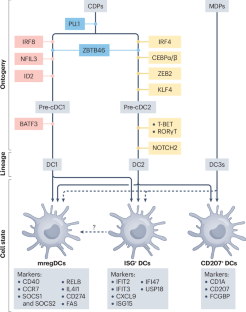肿瘤中的树突状细胞成熟
IF 66.8
1区 医学
Q1 ONCOLOGY
引用次数: 0
摘要
树突状细胞(dc)是一种特化的抗原呈递细胞,在血液循环和组织中以低丰度存在;它们作为关键的免疫哨兵,通过不断采样环境,迁移到次级淋巴器官,并通过抗原呈递形成适应性免疫反应。由于它们能够协调对特定抗原的耐受性或免疫原性反应,dc在抗肿瘤免疫和对免疫检查点封锁和其他免疫治疗方法的反应中起着关键作用。dc的多方面功能是通过称为成熟的复杂的多阶段过程获得的。虽然炎症触发因素在驱动DC成熟中的作用在几十年前就已经确立,但对于非炎症背景下的DC成熟,如在体内平衡和癌症中,我们知之甚少。单电池技术的出现使得各种直流状态(包括成熟的直流)的无偏、高维表征成为可能。这种方法澄清了与DC成熟相关的分子程序,也揭示了癌症如何利用这些途径来破坏免疫监视。在这篇综述中,我们讨论了癌症破坏DC成熟的机制,并强调了调节DC状态的新治疗机会。这些见解可以为以dc为中心的免疫疗法的发展提供信息,扩大增强抗肿瘤免疫的策略库。本文章由计算机程序翻译,如有差异,请以英文原文为准。


Dendritic cell maturation in cancer
Dendritic cells (DCs) are specialized antigen-presenting cells that are present at low abundance in the circulation and tissues; they serve as crucial immune sentinels by continually sampling their environment, migrating to secondary lymphoid organs and shaping adaptive immune responses through antigen presentation. Owing to their ability to orchestrate tolerogenic or immunogenic responses to a specific antigen, DCs have a pivotal role in antitumour immunity and the response to immune checkpoint blockade and other immunotherapeutic approaches. The multifaceted functions of DCs are acquired through a complex, multistage process called maturation. Although the role of inflammatory triggers in driving DC maturation was established decades ago, less is known about DC maturation in non-inflammatory contexts, such as during homeostasis and in cancer. The advent of single-cell technologies has enabled an unbiased, high-dimensional characterization of various DC states, including mature DCs. This approach has clarified the molecular programmes associated with DC maturation and also revealed how cancers exploit these pathways to subvert immune surveillance. In this Review, we discuss the mechanisms by which cancer disrupts DC maturation and highlight emerging therapeutic opportunities to modulate DC states. These insights could inform the development of DC-centric immunotherapies, expanding the arsenal of strategies to enhance antitumour immunity. Dendritic cells (DCs) shape the adaptive immune response to peripheral tissue antigens and, as such, are crucial for mounting an effective antitumour immune response in cancer. This Review outlines the molecular basis of DC maturation, highlights the mechanisms through which cancer impairs DC maturation and considers the potential for DC-focused cancer immunotherapeutics.
求助全文
通过发布文献求助,成功后即可免费获取论文全文。
去求助
来源期刊

Nature Reviews Cancer
医学-肿瘤学
CiteScore
111.90
自引率
0.40%
发文量
97
审稿时长
6-12 weeks
期刊介绍:
Nature Reviews Cancer, a part of the Nature Reviews portfolio of journals, aims to be the premier source of reviews and commentaries for the scientific communities it serves. The correct abbreviation for abstracting and indexing purposes is Nat. Rev. Cancer. The international standard serial numbers (ISSN) for Nature Reviews Cancer are 1474-175X (print) and 1474-1768 (online). Unlike other journals, Nature Reviews Cancer does not have an external editorial board. Instead, all editorial decisions are made by a team of full-time professional editors who are PhD-level scientists. The journal publishes Research Highlights, Comments, Reviews, and Perspectives relevant to cancer researchers, ensuring that the articles reach the widest possible audience due to their broad scope.
 求助内容:
求助内容: 应助结果提醒方式:
应助结果提醒方式:


